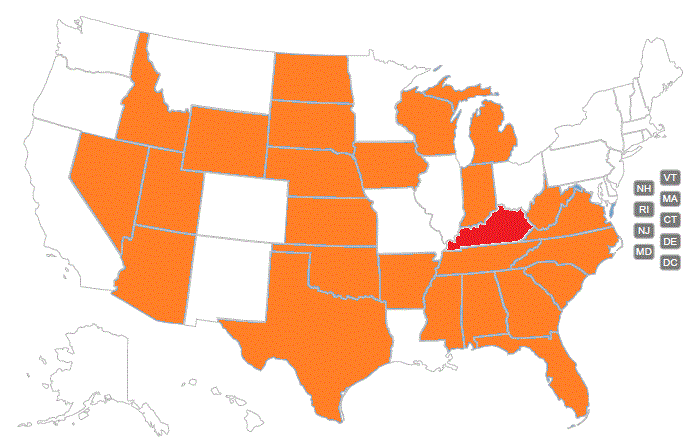Kentucky Right-to-Work Law Gets Green Light
Workers in the Bluegrass State canft be compelled to pay union fees
By Lisa Nagele-Piazza, SHRM-SCP, J.D.
Jan 11, 2017 - SHRM
Kentucky Gov. Matt Bevin signed a bill on Jan. 7 making the Bluegrass State the 27th right-to-work state in the country.
"Closed shops" that require union membership as a condition for being hired and for continued employment were outlawed under the Taft-Hartley Act in 1947. But "union shops" are still permissible under federal law. Union shops require employees to either join a union or pay certain membership fees within a specified timeframe after being hired.
For example, a collective bargaining agreement might stipulate that new bargaining unit members must pay dues after 30 days, explained Mark Neuberger, an attorney with Foley & Lardner in Miami.
Federal labor law, however, allows states to establish "right-to-work" laws.
Kentucky's right-to-work law essentially "outlaws the union shop," said Tom Birchfield, an attorney with Fisher Phillips in Louisville. "This means that it will be illegal for a company and union to agree that union membership or the payment of any union dues is a condition of employment."
Kentucky's law gives employees the right to decide whether they want to join a union and/or pay dues, said David J. Pryzbylski, an attorney with Barnes & Thornburg in Indianapolis.
"Accordingly, the primary issue unionized employers in Kentucky need to account for now is seeking to alter any clauses in their collective bargaining agreements that require employees to join a union and/or pay union dues as a condition of employment," he noted.
"For employers that have current labor contracts, however, the law does not require the company and union to change anything until the current labor contracts expire," Birchfield explained. "From that point forward, it will be illegal to have a union shop provision in a labor agreement."
Neuberger said it could therefore take as long as two to three years for Kentucky's law to have an impact on currently unionized workforces.
The new law also contains a provision preventing public employees from striking.
Right-To-Work State Map:

'Mixed Bag'
Under federal labor law, a union must represent all workers in a bargaining unit regardless of their membership status, Neuberger explained.
Labor organizations tend to argue that right-to-work laws promote "free riding," meaning that employees get the benefits of union membership without paying their "fair share."
In a right-to-work state, a union's economic and political strength may decrease because it won't have as much revenue from dues payments, Neuberger said.
Proponents of right-to-work laws, however, view it as undemocratic to make workers pay for representation they may not want—particularly for lobbying efforts, he added.
Neuberger said the new law is a "mixed bag" for employers. For nonunionized workforces, there is now less incentive for a union to try and organize because it can't guarantee a revenue stream, he said.
Although right-to-work laws may diminish a union's economic strength, the new law might make negotiations harder for currently unionized workforces in Kentucky, he noted. It may strain an employer's relations with the union, and at least in the short term, the union might bargain harder over other aspects of the labor contract.
However, if the right-to-work law really does attract more business to the state, that's good for all Kentuckians, he added.
What's Next?
Until the last five years, there was a fairly fixed group of about 20 southern and western states with right-to-work laws, Neuberger said. Then as Republicans gained control in state legislatures, they pushed for these laws in northern states such as Michigan, Indiana, Iowa and Wisconsin.
"It is definitely possible that we will see additional right-to-work legislation in the near future," Pryzbylski said. "Republicans—who almost always are the ones to introduce and pass these laws—saw many gains in state elections this past fall, including in Kentucky."
There are already efforts to enact such laws underway in Missouri and New Hampshire, he added. "So we could see at least two more states joining the right-to-work ranks soon."